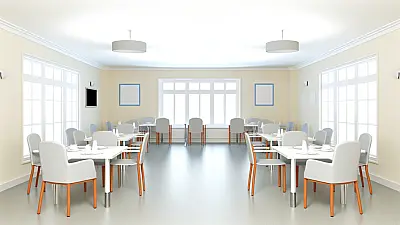LAKE PROVIDENCE, LA - State health inspectors documented widespread fly infestations throughout Cypress at Lake Providence nursing home during a May 2025 inspection, finding insects in multiple resident rooms and observing residents repeatedly swatting flies away from their food during meals.

Persistent Infestation Affects Daily Living
The inspection team observed flies throughout the facility on all three days of their survey from May 19-21, 2025. The problem was particularly severe in resident rooms, where multiple residents reported ongoing issues with flies interfering with their ability to eat and rest comfortably.
During breakfast observation on May 20, inspectors witnessed Resident #52 actively swatting flies away while attempting to eat his morning meal. The resident told inspectors he had to "constantly shoo flies away from his food when he ate." The previous day, several flies were visible in his room during the inspection visit, and the resident confirmed the problem persisted throughout the survey period.
Similar conditions existed in Resident #15's room, where inspectors observed several flies on May 19. The resident expressed frustration about the severity of the fly problem both in his personal space and throughout the facility's common areas. When inspectors returned the following morning, the resident reported that flies remained problematic, with multiple insects still visible in the room.
The most severe infestation appeared to be in Resident #20's room, where inspectors documented "numerous flies" on May 19. The resident confirmed that flies were "bad in his room and in the hallways." Follow-up observation the next day revealed multiple flies remained present despite the passage of time.
Health Risks and Medical Implications
Fly infestations in healthcare settings pose significant health risks, particularly for elderly nursing home residents with compromised immune systems. Flies are mechanical vectors that can carry and transmit numerous pathogens on their bodies and through their feeding habits. These insects frequently land on contaminated surfaces before coming into contact with food, wounds, or medical equipment.
The presence of flies near food creates immediate contamination risks. Common houseflies can harbor more than 100 different pathogens, including bacteria that cause gastrointestinal infections, respiratory illnesses, and wound infections. When flies land on food or eating utensils, they can transfer these microorganisms directly to items that residents consume.
For nursing home residents who may already have difficulty eating due to medical conditions, the added stress of constantly defending their meals from insects can lead to reduced food intake. This situation potentially contributes to malnutrition, dehydration, and unintended weight loss - serious concerns for elderly individuals whose nutritional status directly impacts their overall health and recovery from illness.
Facility Standards and Pest Control Requirements
Federal regulations require nursing homes to maintain effective pest control programs that prevent infestations from occurring. Facilities must implement comprehensive strategies that include regular inspections, preventive measures, and immediate corrective action when pests are identified. Standard protocols typically involve sealing entry points, maintaining proper sanitation, eliminating breeding sites, and scheduling regular professional pest control services.
The widespread nature of this infestation - affecting multiple rooms and persisting across several days - indicates a systemic failure in the facility's pest management approach. Effective programs should prevent flies from establishing populations within the building through proper waste management, regular cleaning schedules, and maintenance of door and window screens.
When facility Administrator S1 was informed about the extensive fly problem on May 21, the final day of the inspection, he acknowledged that he had "also observed flies within throughout the building," confirming staff awareness of the ongoing issue.
Additional Issues Identified
The inspection classified this violation under federal tag F925, which mandates facilities maintain pest control programs. The deficiency was categorized as causing "minimal harm or potential for actual harm" and affected "some" residents, though the widespread nature of the problem suggests broader impact than initially documented.
The persistence of the infestation across all survey days indicates inadequate response to an known problem, raising questions about the facility's maintenance protocols and responsiveness to environmental health hazards.
Full Inspection Report
The details above represent a summary of key findings. View the complete inspection report for Shady Lake Nursing Home from 2025-05-21 including all violations, facility responses, and corrective action plans.
💬 Join the Discussion
Comments are moderated. Please keep discussions respectful and relevant to nursing home care quality.